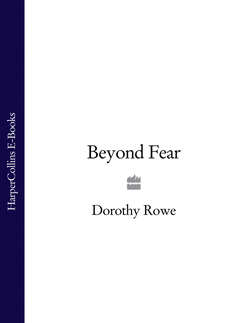Читать книгу Beyond Fear - Paula Nicolson, Dorothy Rowe, Dorothy Rowe - Страница 8
Fight or Flight
ОглавлениеFear has a vital life-saving function. It is the means by which our body mobilizes itself to move swiftly and efficiently to protective action. When we interpret the situation we are in as dangerous, adrenaline, which is produced by the adrenal glands just above the kidneys, as well as at the ends of the neurones in the brain, is pumped into our system, thus causing our heart rate, blood pressure and blood sugar level to increase, and so preparing the body to fight or flee. If we act physically, by striking out at the source of the danger or by taking to our heels and running away, then we make use of our body’s preparations. But if we neither fight back nor run away we are left with the effects of these preparations and they can be most unpleasant.
Our heart beats fast and we feel shaky, sweaty and tingly. Some people experience severe headaches, some feel nauseous, some feel dizzy and close to fainting. Some people do faint. When these reactions occur in company, where we need to be calm and collected, we can feel very ashamed of ourselves. When they occur and we do not know why, we can feel frightened and so start on the sickening cycle of fearing fear itself.
Faced with an external danger, such as a man carrying a gun, or an oncoming monstrous tsunami, we can stand and fight or flee. However, sometimes the people around us will not let us do either. Children who are frightened of their parents or teachers may be prevented from either fighting to protect themselves or running away. Lacking the means to support themselves or their children, women may be unable to flee from husbands who frighten them. Needing to support their families, men may be unable to fight or flee from employers who frighten and mistreat them.
Thus it is very easy to find ourselves in a situation where we wish to fight or to flee but feel that we can do neither. Such a conflict leaves our mind in a turmoil and our body reacting appropriately to our reading of the situation (danger) and inappropriately to our reaction to our reading of the situation (neither fighting nor fleeing).
If we can make such a conflict explicit, by thinking about it very clearly and honestly and by discussing it with understanding friends and counsellors, then we can often find a way to solve the conflict or to live with it more easily. But if we dare not make the conflict explicit to others or even to ourselves, then we cannot resolve it and our misery goes on.
Shirley came to see me because she was nervous. She had given up driving because she was frightened she would have an accident and hurt someone.
‘I’m not worried about hurting myself. It’s other people that I worry about.’
She felt nervous when she had to go into a room where there were other people.
‘I worry that they’ll all look at me. Yet I like going out and having a social life. It’s just I sort of feel ashamed. I don’t know why. I do go out, like we go out for a drink, and I find my hands shaking.’
She said that what she wanted was to feel more confident.
‘I’ve never felt confident.’
Her brothers, all older than her, used to tell her that, as she was a girl, she could not play with them. At school her teachers told her that she was not bright.
‘I mightn’t be brainy but I’m intelligent. That’s what I’m always telling my husband. He treats me like I’m stupid and don’t know anything. But you can’t tell him. He’s one of those men who always have to be right. Don’t get me wrong, he’s a wonderful husband and thinks the world of me, but he does put me down.’
She spoke of how important it was to her to be herself, to have a small job so she had some money of her own, and how annoyed she got with herself when she became too nervous to do the things that she wanted to do. Yet, when she spoke of being confident, there was some sense of reservation. She would not want to be totally confident.
Why was that? Well, a great deal is expected of totally confident people. People expect them to be able to cope with everything. Shirley’s problem was that if she became totally confident she would be asked to do things which she could not or would not do, and she did not want to say no to people.
‘I don’t like to upset people. I want to be liked.’
If Shirley’s problem had been simply that she lacked self-confidence, then she could have solved that problem by taking steps to increase her self-confidence, but if she also believed that if she was self-confident she would upset people and they would dislike her, she could not afford to become self-confident.
